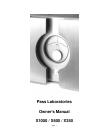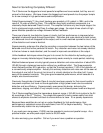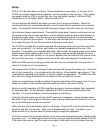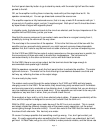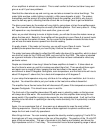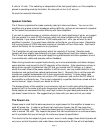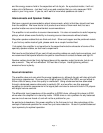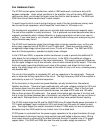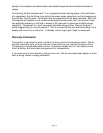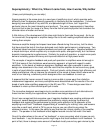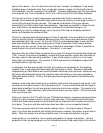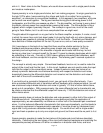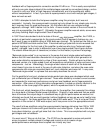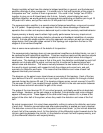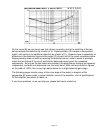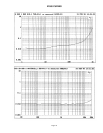Page 6
9 volts to 15 volts. This switching is independent of the front panel button, so if the amplifier is
placed in operating mode by the button, the relay will not turn it off, only on.
So much for essential information.
Speaker Interface
The X Series is optimized for loads nominally rated at 4 ohms and above. You can run the
amplifiers into a lower nominal impedance without difficulty, and we are not aware of a speaker
on the market that presents unusual difficulty with these amplifiers.
If you wish to maximize power or minimize distortion for loads rated below 4 ohms, we suggest
that you parallel 2 or more X1000 channels, which will allow multiples of the 20 amp rating.
For example, if you desire to achieve 16,000 watts peak into 1 ohm, you will want to use 4
amplifiers in parallel. If you want lower distortion at that figure, you will use more. Remember
that running arrays of X1000 channels requires an interface unit from Pass Labs. Feel free to
consult the factory for the answers to any questions.
The X amplifiers do not care particularly about the reactivity of the load. Reactive loads
typically will have slightly less distortion at a given voltage/current level than resistive loads.
The X circuit was designed to be quite happy driving electrostatic and other speakers, since it
is unconditionally stable and operates without feedback.
When driving transformer-coupled loads directly, as in some electrostatic and ribbon designs,
some attention must be paid to the DC character of the situation. If the transformer primary is
being driven raw with no protection from DC and your source has DC voltage, or in cases
where the small offset of the power amplifier is still too much, you may create distortion in the
transformer and get less than optimal performance from it. Generally this is not the case with
transformer coupled loudspeakers, but it does occasionally surface. In these cases, take
special care that the source does not contain a DC component, and confirm the DC offset of
the amplifier is sufficiently low. This is easily adjusted by a qualified technician armed with the
service manual. Again, consult your dealer or call us.
The damping factor of this amplifier is not extremely high as it is with some other high power
products, but it is the same at all audio frequencies and occurs naturally without feedback.
Some people are concerned that they need high numbers for good bass performance, but it
just doesn’t seem to be so. We suggest that you listen with your ears and not your meter.
The Power Line
Please keep in mind that the data we present on output power for this amplifier is based on a
solid AC power line. In order to get these high continuous figures, the AC line cannot be
allowed to collapse. Typically in maximum power testing, a household line will fall from 120
volts to around 105 volts. This impacts the power that can be delivered on a continuous basis,
and it is probable that you will not get full continuous power at specification.
This should not be the subject of great concern, since in audio usage, these kinds of power will
only occur as brief transients, and under these circumstances the AC line will not load badly,



